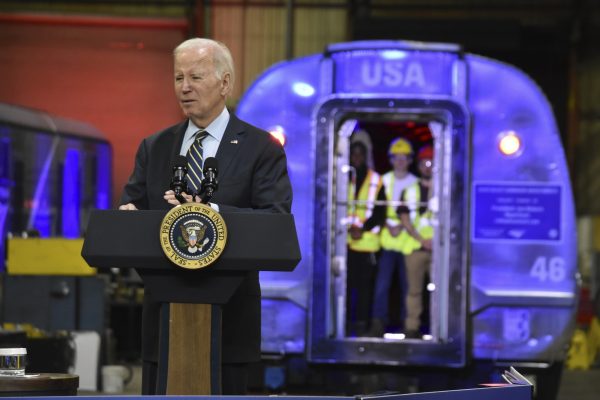Strong, independent labor movements have always been critical to inclusive prosperity. By organizing large-scale, disruptive strikes, workers can secure better pay. The United States, for example, has recently experienced a wave of teacher strikes in which teachers have effectively resisted public education cuts, secured better pay, and inspired hope. Through successful activism, many teachers have become emboldened, realizing they can influence wage negotiations.
Unions work, now and historically. Yet U.S. union membership is at an all-time low, which curbs union efficacy. Without harnessing their strength in numbers, workers struggle to secure wage hikes and resist anti-union legislation. The vicious cycle then perpetuates hopelessness, further discourages unionization, and compounds inequality.
What can be done? In his policy proposal, Suresh Naidu argues that workers’ proclivity to unionize is a cost-benefit analysis. He proposes clever ways to increase the benefits and lower the costs of collective action. Unions could recruit more members by providing valued training and financial rewards, by convincing influential workers, and by raising expectations of wider support. Unions could also increase their efficacy by targeting financial entities higher up the value chain (similar to the Justice for Janitors campaign), by prohibiting employers from hiring replacement workers, and by mandating that the benefits of automation be shared with all workers. If unions were more effective and membership was more beneficial, then U.S. workers would be more likely to join. Absolutely.
But what about the workers making our clothes, shoes, and electronics in global supply chains? They face even larger obstacles to organization: anti-union legislation, hostile bureaucracies, dismissals, blacklisting via biometrics, brutal police, hired thugs, and little hope of success. The governments of low- and middle- income countries often repress labor to keep costs down and maintain export competitiveness. As U.S. companies scour the world for low costs, exporters try to boost competitiveness by cutting corners on safety, curtailing labor inspectorates, and neutering trade unions. And when one government quashes workers’ freedom of association and collective bargaining rights, its economic competitors tend to follow suit.
So how can we tackle labor repression in global supply chains? The short answer is global economic incentives, so that labor repression ceases to be a competitive export strategy. Once governments adopt prolabor reforms, domestic activists become less fearful and mobilize for substantive change.
Consider what happened in Vietnam while negotiating the Trans-Pacific Partnership (TPP). Before TPP, the government of Vietnam prohibited independent trade unions. Even though some members of the party-state and wider civil society were privately supportive of independent unions, they stayed quiet for fear of repercussions. Without seeing public dissent, others doubted the possibility of political change.
The United States insisted that Vietnam allow independent unions if it wanted to join TPP. Because Vietnamese leaders desired increased market access, it became politically acceptable to openly discuss independent trade unions. Top-down authorization reduced fears of reprisals and legitimized more open discussions. Reformists became more vocal, realized wider support for independent unions, and became emboldened to further their preexisting agenda. This fostered a positive feedback loop, culminating in a resolution to permit independent trade unions..
That is where the good news ends. Reform stalled when the economic incentives rescinded. Following Donald Trump’s election, the United States withdrew from TPP. Without the incentive of increased market access, the government of Vietnam put legislative change on hold, reversed earlier liberalization, passed new legislation punishing dissent (much like China’s surveillance laws), and detained independent activists. Vietnamese NGOs now struggle to gain government approval.
Global economic incentives also incentivized prolabor reforms in Bangladesh. The Rana Plaza factory collapse in 2013 killed over a thousand garment workers and triggered international outcry. The government of Bangladesh feared buyers would flee en masse. The EU threatened trade sanctions, and the Obama administration suspended Bangladesh’s trade privileges. To salvage its reputation and preserve export growth, the government of Bangladesh announced a series of prolabor reforms, including allowing workers to unionize without disclosing their list of supporters to factory owners.
Domestic activists seized on this political liberalization, registering 228 new unions between 2013 and 2014. Unions also strengthened their organizational skills, recruiting new members, securing trust, collecting fees, strengthening internal democracy, and experimenting to overcome management repression. Feeling “hopeful,” over 50,000 garment workers went on strike in September 2013 (5 months after Rana Plaza) and secured a minimum wage hike.
But prolabor reforms were contingent upon global economic incentives. Despite the government’s fears, exports actually grew after Rana Plaza. U.S. firms continued to source from Bangladesh with only a minority signing onto health and safety initiatives. Many turned a blind eye to abuses and continued to squeeze prices.
As global economic incentives shifted, the government resumed labor repression, refusing to register trade unions. By 2016 the government was rejecting nearly half the union applications in Dhaka. In December of that year, garment workers went on strike again to call for a higher minimum wage. (Minimum wage is currently $63 a month, among the lowest in the global garment industry.) Sixteen hundred workers were fired, and thirty-five labor organizers and workers arrested. Seeing violent repression, many workers became despondent and stopped trying to unionize. Just last month, at another demonstration for higher wages, police fired rubber bullets and tear gas. One garment worker was killed, 50 were injured, and 11,600 lost their jobs. Without a strong labor movement, real wages continue to fall.
Going forward, we need to entrench prolabor incentives in global supply chains, so that labor repression is no longer conducive to export competitiveness. One policy option is Dani Rodrik’s anti-social dumping scheme; another is corporate accountability. Without corporate accountability, we have corporate impunity.
But change is afoot. In France all large companies must reduce risks of human rights and environmental abuses in their supply chains—or else be liable. In 2018 the Swiss National Council voted for similar legislation. The German Ministry of Economic Cooperation recently announced a draft law. Politicians in Finland, Germany, and Luxembourg have called for EU-wide regulation
Corporate accountability might incentivize more scrupulous sourcing, making prolabor reforms and inclusive prosperity more economically competitive export strategies.








